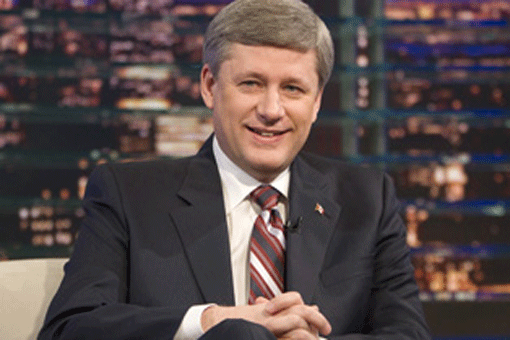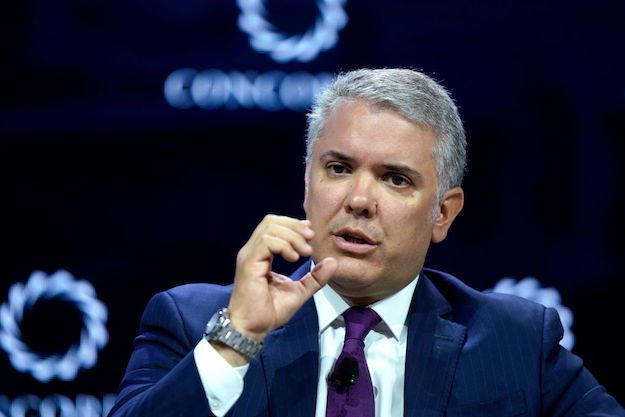President Barack Obama’s recent day-trip to Canada’s capital not only set a positive tone for dealing with sensitive bilateral and global issues, it put a rare smile on Prime Minister Stephen Harper’s face and highlighted one of Liberal leader Michael Ignatieff’s positive attributes: his connections to the United States.
The 7-hour visit gave Stephen Harper a chance to refocus his agenda and build his international profile as the future of his minority Conservative government is in doubt.
Perceived here as too close to George W. Bush, it was an opportunity for Harper to show he can manage the transition in Canada-U.S. relations and engage in a meaningful relationship with Obama.
Both Harper and Ignatieff said they were charmed by Obama’s style but by all accounts, Ignatieff had more to gain from a face-to-face meeting with Obama than Harper. Not yet a household name with Canadians, the meeting gave the ex-Harvard professor stature as a prime-minister-in-waiting.
After a face-to-face meeting that stretched 10 minutes longer to a total of 30 minutes at the airport just before Obama’s departure, Ignatieff recounted his chat with the President. He suggested the President shared his views about the uneasy war against the Taliban in Afghanistan. He also discussed the fate of 22-year-old Omar Kadr at Guantanamo Bay, trade issues, border security, and the December political crisis that threatened to throw Harper out of power. He said the president was “very aware of the crisis and the political situation in Canada.”
And on a personal note, the two men chatted about common friends and books.
“He told me he read a number of my books before he entered politics,” a beaming Ignatieff told reporters after his meeting.
The rapport between the two men did not go unnoticed.
Ignatieff may have “more in common” with Obama than Harper, wrote The New York Times. As a former director of Harvard’s Carr Centre for Human Rights, he worked with Samantha Power, an advisor on foreign policy during Obama’s campaign.
Described in another article by the Times as a leading intellectual and a “throwback to the era of the dashing Pierre Trudeau,” the chance to meet with the immensely popular Obama in Canada, was a welcome distraction for Ignatieff after plans to defeat Harper’s government in January failed to materialize.
Indeed, after much talk about toppling Harper’s government, it turned out to be just that: talk.
On January 28, a day after the federal budget was introduced in Canada’s House of Commons, Michael Ignatieff, the newly minted leader of the Liberal Party, and the one man who had the power to defeat Prime Minister Harper, backed away from the opportunity.
At a press conference in Ottawa, Canada’s capital, Ignatieff announced his party would support the minority government if Harper agreed to submit quarterly progress reports on the budget’s implementation schedule and costs in March, June and December.
The Opposition will be “watching like hawks,” Ignatieff warned, to make sure the Conservatives “get the money out the door” and that Canadians get the help they need.
The Liberal leader criticized the government’s handling of the current economic crisis and renewed calls for a stimulus package to help Canadians retain jobs and ride out the worst economic crisis in decades. The former Harvard professor warned Harper he was “putting his government on probation.” And he vowed to bring the government down, should the government’s budget fail to meet three conditions: protect the most vulnerable, save jobs and create the jobs of tomorrow.
Still gasping for air after a near-collapse in December, Harper’s team had little choice but to agree to increasing spending. Bent on rescuing Harper’s badly-damaged reputation as a competent economic manager, the prime minister’s entourage had hinted that the government would run a huge deficit to pay for measures to stimulate the economy as the country plunged deeper into a recession. It was quite a turnaround for Harper, a former Calgary economist, who a few months earlier had said the country’s finances were in good shape.
On January 27, Finance Minister Jim Flaherty presented an enticing budgetary stimulus package in the House of Commons. The do-or-die budget came a day after a new slimmed-down Speech from the Throne set the tone for the parliamentary session. With the Prime Minister listening, Governor-General Michaëlle Jean, Canada’s head of state, said it would be “misguided to commit to a balanced budget in the short term at any cost” in a “historic global downturn.”
When the budget vote was finally held on February 3, the results were predictable. With the Liberals’ critical support, the House of Commons passed the budget by a 211 to 91 vote, ensuring the government’s survival.
The Liberal leader’s about-face sparked criticism from the left-leaning New Democratic Party and the Quebec-based separatist Bloc Québécois, both of whom voted against the budget. They accused Ignatieff of betraying the principles of the Liberal-New Democratic Party (NDP) coalition he had endorsed less than two months earlier, intent on defeating the government at the first opportunity. As had been agreed by all, the Bloc Québécois would not formally join the coalition but would support it at least until the middle of 2010, a move that did not register well with Canadians.
Although the budget is expected to saddle the Conservative government with towering deficits of about $85 billion over five years and the first deficit in 13 years, passage of the budget came as a huge relief for Harper.
Last December a fierce backlash to his November 27 economic update pushed his minority government to the brink of defeat. It was perceived by opposition parties as too ideological, fiercely partisan and out-of-touch with the country’s economic needs. Shaken, the Harper government was forced to quickly withdraw unpopular measures and backtrack on a promise to end public subsidies to political parties—a tactic, according to opposition parties, designed to bankrupt them. The Governor-General then agreed to prorogue Parliament (discontinue the Parliamentary session) until a new session in January, giving Harper’s government much-needed breathing room.
This time, the Conservatives were able to swiftly turn their fate around, tossing out their firmly-held beliefs about a market-driven economy and balanced budgets in the process. After consulting with the Liberals, they came back with a budget designed to garner wider appeal and calm tempers.
Generally well received by provinces facing massive layoffs and business shutdowns, the budget promised to spend $40 billion over two years to kick start the economy. Measures include spending on infrastructure, social housing, home retrofits, parks, tourism, railways, Arctic research, and $2 billion in income tax cuts.
For Ignatieff, the budget vote was his first test as Liberal leader. His decision to, in effect, end the unpopular coalition was taken partly to appease a minority of Liberal MPs (Members of Parliament) who had publicly voiced their opposition to the budget. But it was also an important measure of his ability to control his caucus and win national support—crucial to whether he will remain as Opposition Leader or step some day into the Prime Minister’s shoes.
That was one reason why he risked the embarrassing step of allowing six Liberal MPs from Newfoundland and Labrador a “one-time-only” protest vote against the budget. They had argued the budget singled out their province, robbing it of an estimated $1.6 billion of federal transfer payments. Barely three years after he was elected as a rookie MP from Toronto, Ignatieff, 61, needs to overcome impressions that he is still an inexperienced politician. But his coalition-busting move may have helped him.
While his predecessor, the unpopular Stéphane Dion, who quit abruptly in December, saw it as a means to an end to get rid of the Conservatives, Ignatieff saw a coalition as a double-edged sword. Polls showed support for a coalition was evaporating across the country. Outside Quebec, there was no appetite for an alliance with the Bloc Québécois, which seeks independence from Canada even though it sits in the national parliament. And it was not clear whether a power-sharing agreement with the NDP, which was promised six cabinet seats until June 30, 2011, would serve the Liberal Party well. Indeed, some Liberal MPs were starting to question the logic of sharing power with the NDP at a time when their party could do better on its own with a brand-new leader at the helm.
After the budget vote, Ignatieff told MacLean’s Magazine it “was not in the national interest” to defeat the government and force an election so soon after the October 14 vote since the country was facing “unprecedented times.” In those circumstances, he added, sticking with a coalition agreement “was not a responsible choice.” And he made clear that he would not “go into coalition governments with the Bloc Québécois, period.”
As the uproar in the House of Commons has receded, the Liberal Leader’s gamble seems to have paid off, at least in the short term. An impressive 72 percent of Canadians agreed with his demand for quarterly budget updates from the Conservatives. According to a Harris-Decima poll, Ignatieff’s support on this issue is broad in all regions.
Even more to the point, the gap is closing between Canada’s two dominant rival political camps. A recent Nanos Research poll shows Liberal support moved to 34 percent, one point ahead of the Conservatives and up eight points from the Liberals’ showing in the October 14 election. The Liberals made gains in Quebec. They are now leading with 39 percent support, compared to 29 percent for the Bloc, 17 percent for the Tories and 14 percent for the New Democrats.
And Ignatieff, whose intellectual demeanor is often criticized as arrogance, is also making headway among Canadian voters. When asked by Harris-Decima in a February 9 poll about their impression of the leaders, Harper and Ignatieff were seen in a favorable light by 43 percent of Canadians. But where the Liberal leader has potential to grow, Harper’s numbers remain relatively unchanged since the October election. The prime minister’s support comes mainly from his own electoral base in Western Canada.
The real test for Ignatieff will be to maintain that momentum when it’s time to go to the polls. The next milestone will be the March fiscal update—a promise extracted from the Conservatives by the Liberals. Odds are that the Conservatives will come up with a palatable progress report. Odds are that the Liberals will accept the verdict. The status quo then will likely prevail. An election now, in the midst of a growing economic crisis, would not go over well.





